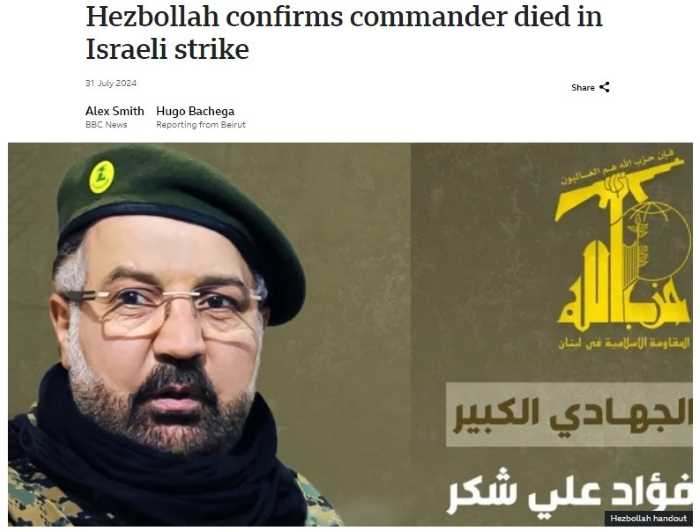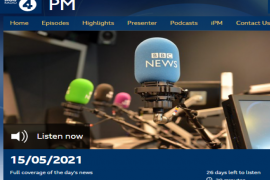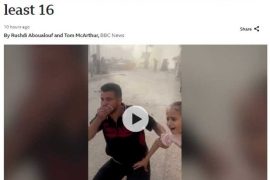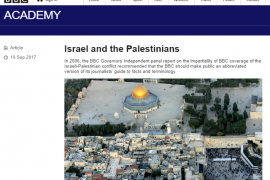Previously we discussed the BBC News website’s coverage of the July 27th Hizballah rocket attack on Majdal Shams in which twelve children were murdered and over forty others wounded.
BBC NEWS WEBSITE COVERAGE OF THE MAJDAL SHAMS MASSACRE
REVIEWING BBC COVERAGE OF THE HIZBALLAH ATTACK ON MAJDAL SHAMS – PART ONE
REVIEWING BBC COVERAGE OF THE HIZBALLAH ATTACK ON MAJDAL SHAMS – PART TWO
As was noted at the time:
“As we see, most of the eleven items of content pertaining to the attack on Majdal Shams that were published on the BBC News website between July 27th and July 29th promoted Hizballah’s denials of involvement and in some cases even amplified the terrorist organisation’s disinformation while failing to provide BBC audiences with an accurate and factual account of what had happened.”
Early on the evening of July 30th, Israel eliminated the senior Hizballah commander responsible for that attack on Majdal Shams in the Dahiya suburb of Beirut.
The BBC News website immediately launched a live page which, by the time it was closed just over five hours later, promoted no fewer than ten Hizballah denials of involvement in the Majdal Shams attack, three of which appeared in the first three entries:
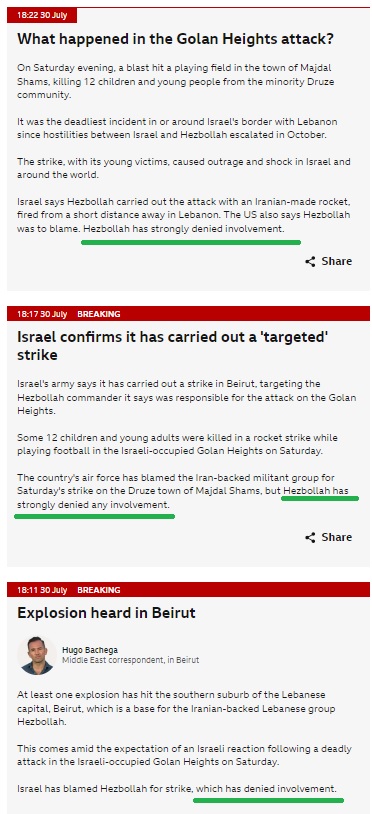
Links to that live page were provided in a July 30th report by Sam Francis headlined “UK nationals urged to leave Lebanon over war risk” in which readers are told that: [emphasis added]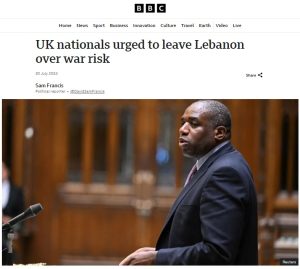
“A rocket strike on a playing field in Israeli-occupied Majdal Shams killed 12 young people on Saturday, sharply escalating fears of a new war in the region.
Israel says the Lebanon-based Hezbollah militant group backed by Iran was behind the attack, though the group has denied this.”
Ignoring the fact that Hizballah is a terrorist organisation proscribed by the UK and many other countries, the report tells readers that:
“Late on Tuesday, at least one explosion hit a southern suburb of the Lebanese capital, Beirut, which is a base for Hezbollah.
Israel’s army said it had carried out a strike and that it was targeting the Hezbollah commander responsible for the attack on Majdal Shams.
Hezbollah is a heavily armed militant and political movement based in Lebanon, Israel’s northern neighbour is financed, equipped, and trained by Iran.”
Also on July 30th – but now dated July 31st – the BBC News website published a filmed report titled “Chaos and damage in Beirut after Israeli air strike”.
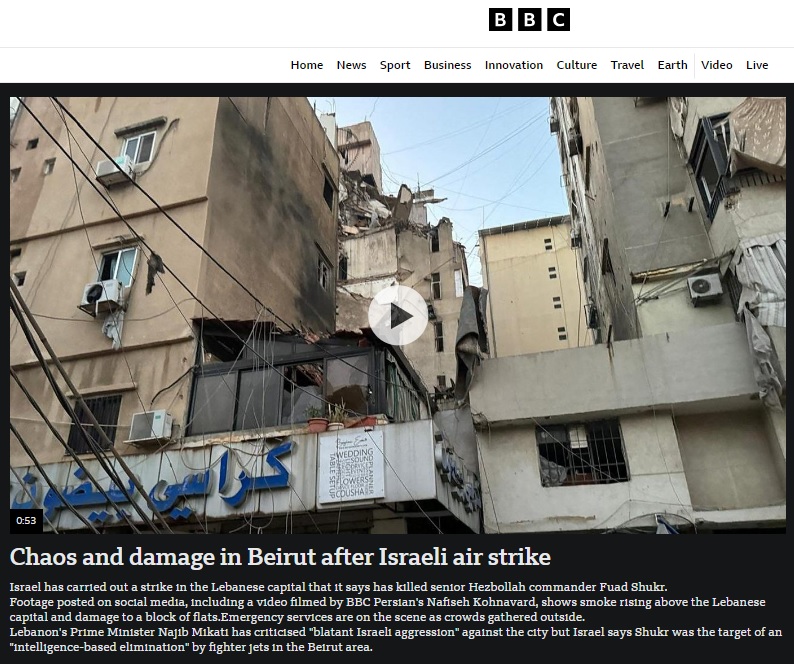
Late on July 30th the BBC News website published a report originally titled “Israel hits Beirut in ‘targeted’ strike on Hezbollah commander”. That report is now dated July 31st and headlined “Israel claims it killed senior Hezbollah commander in strike on Beirut”. It is currently credited to Quentin Sommerville, Nafiseh Kohnavard and Mark Lowen and tells BBC audiences that: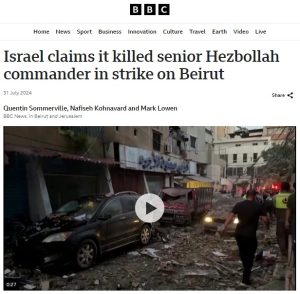
“Israel says it has killed a top Hezbollah commander after carrying out an air strike on a southern suburb of the Lebanese capital, Beirut. […]
Israeli officials say he was responsible for a rocket attack on the Israeli-occupied Golan Heights on Saturday which killed 12 people, mostly children. Hezbollah has denied any involvement in that attack.”
That messaging is repeated later in the report:
“An Israeli reaction had been widely expected after the deadly attack in the Israeli-occupied Golan Heights on Saturday, and Israel’s security cabinet had authorised Mr Netanyahu and Mr Gallant to decide how to retaliate.
At least 12 people were killed – mostly children – when a rocket hit a football pitch in Majdal Shams on Saturday.
Israel has blamed Hezbollah, but the group denies any involvement.”
The report promotes a statement put out by the Lebanese prime minister which was also partly quoted in the synopsis to the filmed report:
“Lebanon’s Prime Minister Najib Mikati condemned “blatant Israeli aggression”.
He described it as a “criminal act” in a “series of aggressive operations killing civilians in clear and explicit violation of international law.””
The targeted Hizballah commander is described as follows:
“Fuad Shukr is believed to be a senior adviser to Hezbollah leader Hassan Nasrallah, the US has previously said.
It has been offering a $5m (3.9m) reward for information about him, alleging he also played a “central role” in the 1983 bombing of a US Marines barracks in Beirut, which killed 241 US military personnel.”
Readers find the near-daily Hizballah attacks on northern Israel over the past ten months, which have resulted in the deaths of 26 civilians and 18 members of the security forces, described as “limited”:
“Hezbollah – which supports Hamas – opened up a limited second front in Israel’s north, and the two sides have been exchanging fire ever since.”
On July 31st the BBC News website published a report by Alex Smith and Hugo Bachega titled “Hezbollah confirms commander died in Israeli strike”. In that report too, BBC audiences find promotion of the terrorist organisation’s talking points: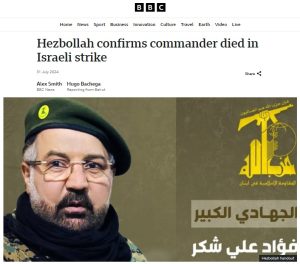
“It [Israel] said the strike was a response to a rocket attack that killed 12 people in the Israeli-occupied Golan Heights on Saturday, which Israel says the commander helped plan.
Hezbollah has denied having any involvement.”
That report’s sole portrayal of Fuad Shukr reads as follows:
“Fuad Shukr, who was in his early sixties, is believed to be a key military adviser to Hezbollah leader Hassan Nasrallah.”
Readers again find promotion of part of the Lebanese prime minister’s statement:
“Lebanon’s Prime Minister Najib Mikati called the attack a “criminal act”.”
And once again Hizballah’s thousands of attacks on northern Israeli communities are described as “limited”:
“There had been regular fighting between Hezbollah and Israel but hostilities have escalated since Hamas’ attack on Israel on 7 October.
Hezbollah – which supports Hamas – opened up a limited second front in Israel’s north, and the two sides have been exchanging fire ever since.
And while so far they have stopped short of an all-out war, near daily attacks have left communities in Israel and Lebanon devastated.”
That linked article was previously discussed here:
MORE PROMOTION OF THE BBC’S SELECTIVE NARRATIVE ON HIZBALLAH
On August 1st the BBC News website published a report by Hugo Bachega headlined “Hezbollah leader says conflict with Israel in ‘new phase’ after killings” in which Fuad Shukr is described as follows: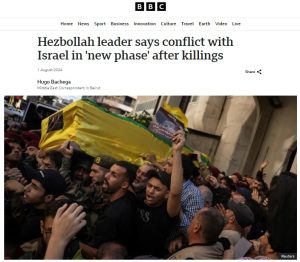
“In Beirut’s southern suburbs of Dahiya, the stronghold of Hezbollah, large crowds wearing black joined the funeral for Fuad Shukr, a senior commander of the powerful Lebanese militia and political movement, and the most high-profile member to have been assassinated by Israel during these current hostilities. […]
Shukr, who was also known as Sayyed Mohsin, was said to be a close adviser to Hassan Nasrallah, the influential and long-time Hezbollah leader.”
Once again BBC audiences found amplification of Hizballah messaging:
“According to the Israeli military, Shukr was behind a missile strike that killed 12 children and teenagers on a football field in the Israeli-occupied Golan Heights last Saturday. Hezbollah has denied involvement, although it initially claimed an attack on a nearby military base, which raised the possibility that the missile missed its intended targeted.”
Bachega tells readers that:
“Hezbollah says its campaign, which started a day after the Hamas attacks on Israel on 7 October, is in support of Palestinians in Gaza. Most of the group’s attacks, and Israel’s counterattacks, have been limited to areas along the Lebanon-Israel border.”
That portrayal of Hizballah’s attacks fails to inform BBC audiences that places including Afula, Nazareth, Haifa and Tiberias have been targeted, as have communities in the Golan Heights that are also nowhere near “areas along the Lebanon-Israel border”.
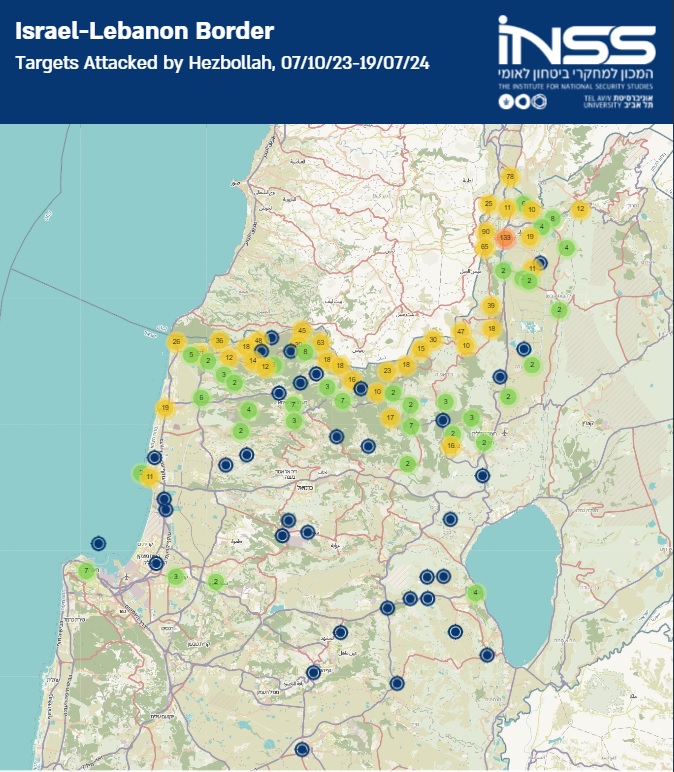
Additional promotion of that ‘border areas’ narrative is found in a report by Hugo Bachega and Tom Bennett published on August 5th under the headline “Calls for foreigners to leave Lebanon as war fears grow”.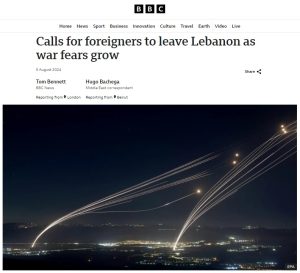
“Most of the violence has been contained to border areas, with both sides indicating not being interested in a wider conflict.”
BBC familiarity with the geography of northern Israel is once again on display in a part of that report which mentions Hizballah attacks on two consecutive days:
“Meanwhile there has been continuing firing between the two sides. Hezbollah said it launched drones at a military barracks in Ayelet HaShahar, northern Israel, in the early hours of Monday morning. The Israeli military said two soldiers were wounded.
It came a day after Hezbollah launched dozens of rockets at the nearby town of Beit Hillel. There were no reports of casualties from that attack.”
Ayelet HaShahar is around 28 kms south of Beit Hillel.
Once again, readers of this BBC report are not informed that Hizballah is a terrorist organisation which is proscribed by the UK and many other countries.
“Western officials fear that Hezbollah, an Iran-backed militia and political movement based in Lebanon, could play a key role in any such retaliation, which in turn could spark a serious Israeli response.”
On August 6th the BBC News website published a report which was originally titled “Israel and Hezbollah trade strikes as tensions simmer” and told readers that:
“Last week, an Israeli air strike killed senior Hezbollah commander Fuad Shukr in a southern suburb of the Lebanese capital Beirut, in what Israeli officials called an “intelligence-based elimination”.
Israeli officials say he was responsible for a rocket attack on the Israeli-occupied Golan Heights last month which killed 12 children and teenagers. Hezbollah has denied any involvement in that attack.”
Later, that report was re-titled “Hezbollah vows retaliation for killing of commander” and credited to Hugo Bachega and Matt Murphy. The sole portrayal of Fuad Shukr in that report describes him merely as “a senior commander”.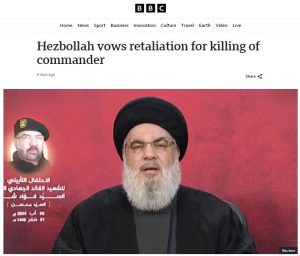
As we see, eleven days after the Hizballah attack on Majdal Shams, the BBC News website was still promoting that inadequately portrayed terrorist organisation’s disinformation in the form of denials of involvement in that massacre of children.
Throughout the eight days following the elimination of Fuad Shukr, BBC audiences were given very little information about his roles and record, with portrayals being confined to generalised terms such as “senior advisor”, “key military advisor”, “close advisor” and “senior commander”. Only one of the BBC’s eight reports on the story mentions the fact that he was wanted by the US government. As reported by the FDD on July 30th:
“The United States sought Shukr for his role in orchestrating and executing the 1983 terrorist attack that killed 241 American service personnel at the Marine Corps barracks in Beirut. Due to his actions on Hezbollah’s behalf, the U.S. Treasury Department imposed sanctions on Shukr as a Specially Designated National on July 21, 2015, while the State Department Rewards for Justice program offered a $5 million reward for information on him. According to an Israeli government statement on July 30, Shukr was one of the architects of the 1994 bombing of the AMIA Jewish center in the Argentine capital Buenos Aires, in which 85 people were killed and 300 wounded.”
On the same day, the IDF noted that:
“Fuad Shukr has directed Hezbollah’s attacks on the State of Israel since October 8th, and he was the commander responsible for the murder of the 12 children in Majdal Shams in northern Israel on Saturday evening, as well as the killing of numerous Israelis and foreign nationals over the years.
As the Head of Hezbollah’s Strategic Unit, Fuad was responsible for the majority of Hezbollah’s most advanced weaponry, including precise-guided missiles, cruise missiles, anti-ship missiles, long-range rockets, and UAVs. He was responsible for force build-up, planning, and execution of terror attacks against the State of Israel.
Fuad joined the Hezbollah terrorist organization in 1985 and has since held a number of senior positions. As part of his role, he was a member of the Jihad Council – Hezbollah’s most senior military forum.
In the 1990s, Fuad advanced numerous attacks against the IDF and the South Lebanon Army. In 2000, he was directly involved in the abduction of the bodies of three IDF soldiers – SSGT Benyamin Avraham, SSGT Adi Avitan, and SSGT Omar Sawaid -who were killed by Hezbollah terrorists while patrolling the security fence adjacent to Har Dov. Since then, he has planned and directed numerous terror attacks against innocent civilians.”
Given that there is no shortage of information about Fuad Shukr in the public domain – including that supplied by Hizballah itself – one must wonder why the BBC chose to exclude that important context to the story from all of its coverage.

